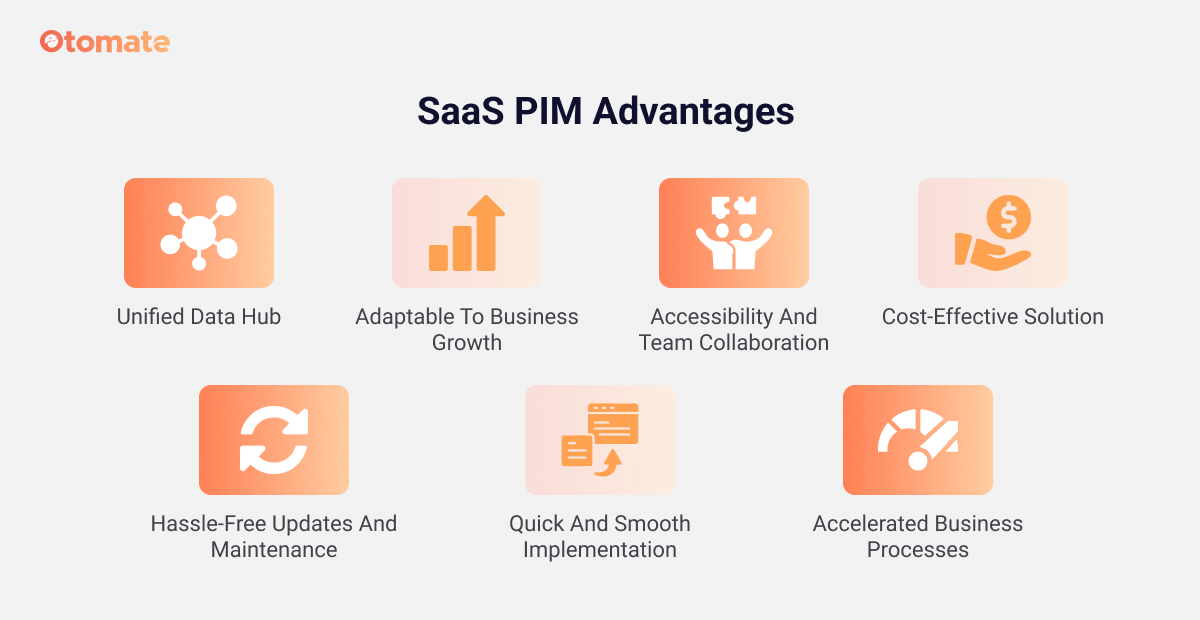What Is a SaaS PIM and How to Choose Your Ideal PIM Solution?
In this article, we’ll unravel the concept of SaaS PIM, exploring its importance and how it stands as a pivotal tool for modern businesses. We will also guide you through the key considerations to keep in mind when selecting the perfect PIM solution to streamline your product information management.

In the digital age, where data reigns supreme, managing product information efficiently is crucial for businesses looking to thrive in the e-commerce landscape. Enter SaaS PIM (Product Information Management) solutions, a game-changer for companies juggling vast amounts of product data: these cloud-based platforms offer a centralized hub for organizing, managing, and distributing product information across various sales channels. But with a sea of options available, how do you choose the ideal PIM solution for your business needs?
Table of contents
- What Is a SaaS PIM System?
- SaaS PIM Pros
- SaaS PIM Cons
- What Is Open-Source PIM Software?
- Open-Source PIM Pros
- Open-Source PIM Cons
- What Is a Custom-Built PIM?
- Custom-Built PIM Pros
- Custom-Built PIM Cons
- SaaS vs. an Open Source vs. a Tailored PIM
- What PIM System to Choose?
What Is a SaaS PIM System?
The acronym PIM stands for 'Product Information Management,' and when prefixed with 'SaaS' (Software as a Service), it transforms into a powerful, cloud-based tool essential for any business dealing with product information.
In other words, PIM is a centralized platform hosted in the cloud, designed to collect, manage, and enrich product information, and then distribute it efficiently to various sales and e-commerce channels.
Unlike traditional PIM tools that require on-premise installation, SaaS solutions are accessible over the Internet, offering greater flexibility, scalability, and reduced IT overhead.
Thus, SaaS PIM is a dynamic solution that streamlines the entire process of managing and distributing product data, enhancing efficiency, and ultimately driving sales and customer satisfaction in the e-commerce realm.
SaaS PIM Pros
Implementing a PIM SaaS system brings a plethora of benefits to modern businesses, streamlining their data management and boosting operational efficiency. Here's a look at the key advantages:
- Unified data hub: SaaS PIM acts as a centralized repository for all product data, ensuring uniformity and precision across diverse platforms. This 'single source of truth' approach eliminates inconsistencies and enhances data reliability.
- Adaptable to business growth: Thanks to its cloud-based nature, it seamlessly adjusts to your evolving business needs. It accommodates growing volumes of product data effortlessly, without the need for investing in additional physical infrastructure.
- Accessibility and team collaboration: Being hosted online, it is accessible from any location, facilitating improved collaboration among team members. This ease of access significantly boosts productivity and streamlines workflows.
- Cost-effective solution: The subscription-based model of Software-as-a-Service PIM means businesses can forgo the hefty initial investment usually associated with traditional software. This pay-for-what-you-use framework is particularly cost-effective for businesses of all sizes.
- Hassle-free updates and maintenance: With PIM SaaS, the responsibility of updates and maintenance falls to the service provider. This ensures that your business always benefits from the latest functionalities and robust security without extra effort or cost.
- Quick and smooth implementation: Deploying such a system is a straightforward process, often quick and without complications. It eliminates the need for an in-house development team, making it an efficient solution for businesses looking to streamline their operations promptly.
- Accelerated business processes: For businesses eager to efficiently manage their product data and accelerate their operations, Software-as-a-Service PIM stands out as an excellent choice. It streamlines data management processes, enabling quicker decision-making and a faster route to market.

In summary, a SaaS PIM system not only simplifies data management but also acts as a catalyst for business growth and efficiency. Its combination of ease of use, scalability, and cost-effectiveness makes it a valuable asset for any business aiming to optimize its product information management.
SaaS PIM cons
While PIM SaaS systems offer numerous advantages, it's important to consider some potential drawbacks before making a decision. Understanding these limitations can help businesses weigh their options more effectively and choose a solution that best fits their needs. Here are a couple of notable cons associated with Software-as-a-Service PIMs:
- Ongoing subscription fees: One of the primary drawbacks of a PIM SaaS system is the recurring subscription cost. Unlike one-time purchase software, it requires ongoing payments, which can add up over time. While the initial investment may be lower, the long-term financial commitment can be significant. Businesses need to factor in these recurring costs while budgeting for such a solution.
- Limited control over source code: With a SaaS solution, businesses rely on external providers for the software infrastructure, which means they have limited or no access to the system's source code. This lack of control can be a concern for companies that require high levels of customization or have specific needs that standard SaaS solutions may not fully address. It also means relying on the vendor for updates, enhancements, and fixes, which can sometimes lead to delays or unmet specific requirements.
As we can see, while SaaS systems are highly beneficial for streamlined data management and operational efficiency, businesses should also consider the aspects of ongoing costs and limited control over the software. Weighing these cons against the pros is crucial in determining whether a SaaS PIM aligns with your company’s strategic and financial objectives.
What Is Open-Source PIM Software?
Open-source PIM software is an alternative to Software-as-a-Service PIM solutions, offering distinct features and advantages. This type of software allows businesses to customize and adapt the PIM system to their specific needs.
At its core, open-source PIM is a product management platform whose source code is freely available for anyone to view, modify, and enhance.
However, it requires a certain level of technical expertise and resources to manage and maintain.
Open-Source PIM Pros
Due to access to the source code, such a PIM can be tailored extensively to fit unique business requirements, offering a level of flexibility that is often not available in SaaS solutions. Plus, these PIMs benefit from the contributions of a global community of developers, leading to innovative features and rapid enhancements.
While there may be costs associated with custom development and maintenance, open-source PIM generally has no licensing fees, making it a potentially more cost-effective solution in the long term.
What’s also important, businesses have complete control over the software and are not reliant on a vendor for updates or changes. This independence can be crucial for companies with specific data privacy or security requirements.
Open-Source PIM Cons
While open-source PIM solutions offer flexibility and customization, there are certain drawbacks that businesses should consider. Understanding these limitations is crucial for making an informed decision about whether such a PIM is the right fit for your business.
First of all, open-source PIMs often require significant resources in terms of time and technical expertise: implementing and customizing such software to fit specific needs can demand a dedicated team of IT professionals, which may not be feasible for all businesses, especially smaller ones. Thus, implementing a SaaS PIM can be a faster option.
There are also potential security risks. Since open-source PIM systems are developed by a community, there can be concerns about security and the quality of the code. It requires vigilant monitoring and regular security updates to safeguard against vulnerabilities.
Customization is a strength of open-source PIM, it can also be a double-edged sword: the process of configuring the software can be complex and time-consuming. Plus, unlike SaaS solutions, the responsibility for maintaining and updating the software falls on the business.
Finally, while open-source PIM solutions can be scalable, achieving this often requires additional customization and infrastructure changes. This can be a challenge for businesses experiencing rapid growth or fluctuating demands.
In conclusion, open-source PIM tools, despite their advantages in customization and cost, present challenges in terms of resource allocation, maintenance, complexity, security, and scalability. Businesses considering an open-source solution should carefully evaluate these factors against their capabilities and needs.
What Is a Custom-Built PIM?
Custom-built PIM systems represent a tailored approach to managing product data. These Pim systems are designed specifically to align with the unique requirements of a business.
Unlike off-the-shelf solutions, a tailored PIM is developed from scratch to cater to specific functionalities, workflows, and integration needs of an organization.
Custom-Built PIM Pros
So, what are the advantages of these PIMs? First of all, they are designed with the specific needs of a business in mind, ensuring that every feature and functionality aligns precisely with the operational and strategic objectives of the company.
Plus, these systems can be seamlessly integrated with existing business processes and systems, such as ERP, CRM, and e-commerce platforms, thereby enhancing efficiency and reducing compatibility issues. As they are built to order, custom PIM systems can be scaled and modified as the business grows and evolves, offering a high degree of flexibility and adaptability.
Finally, a custom PIM can provide businesses with a competitive edge by offering unique features and capabilities not available in standard PIMs, potentially driving better product information management and customer satisfaction.
Custom-Built PIM Cons
Tairoled PIM tools, while offering numerous benefits in terms of customization and integration, require significant investment in terms of time, resources, and capital. They are typically pursued by businesses with very specific needs that cannot be met by existing PIM solutions in the market.
Two of the most significant drawbacks of a tailored PIM are the lengthy development time and a substantial financial commitment. The costs associated with designing, building, testing, and maintaining a bespoke solution can be considerably higher than purchasing and customizing a ready-made product.
Plus, such systems demand ongoing maintenance from a team of skilled IT professionals. There's also a risk that a custom-built system might become overly complex, especially if it tries to cater to every possible requirement. This can lead to difficulties in use, and training, and can complicate future modifications or integrations.
SaaS vs. an Open Source vs. a Custom-Built PIM: A Comparison
When choosing a Product Information Management system, it's crucial to understand how SaaS, Open Source, and Custom-Built solutions compare. Here’s an overview focusing on the cost of development, maintenance, implementation, customization, security, and support:
Thus, each type has its unique advantages and challenges, making the choice highly dependent on individual business requirements.
What PIM System to Choose?
So, what PIM solution will be right for you? This is a decision that hinges on your specific business needs, objectives, and resources. While Open Source and Tailored PIM tools have their unique advantages, a Software-as-a-Service PIM often stands out as the most balanced choice for a wide range of businesses.
Why SaaS PIM Often Wins:
- Ease of use and quick deployment: solutions like Otomate are designed for ease of use and rapid implementation. This means you can get your product information management system up and running quickly, without the lengthy development and implementation phases associated with custom solutions.
- Cost-effective and scalable: With a SaaS PIM, you enjoy the benefits of a subscription-based model, which is typically more cost-effective than the significant upfront investment required for tailored systems. Plus, SaaS solutions like Otomate are highly scalable, growing seamlessly with your business.
- Regular updates and professional support: SaaS solutions provide the advantage of regular updates and enhancements without additional costs or efforts from your team. Otomate PIM, for example, offers continuous updates and professional support, ensuring that your system is always at the cutting edge.
- Robust security and reliability: With such a PIM, you benefit from robust security measures and reliable performance. Providers like Otomate invest heavily in security protocols and infrastructure to ensure that your data is protected and your system is always available.
At Otomate, we understand the complexities and challenges of managing product information. That's why we've developed an ideal Software-as-a-Service PIM solution that not only meets the diverse needs of modern businesses but also offers an intuitive, user-friendly experience. Our solution is tailored to provide the flexibility, scalability, and efficiency that businesses need to manage their product data effectively and drive their e-commerce success.

The choice of a PIM system ultimately depends on your business’s unique requirements and constraints. However, for many, a SaaS PIM like Otomate offers the perfect blend of functionality, affordability, and ease of use.
We encourage you to explore Otomate PIM and discover how it can transform your product information management and e-commerce strategies right now! Plus, if you have any questions related to our product management platform, feel free to reach out – our specialists will be happy to help your business thrive!




